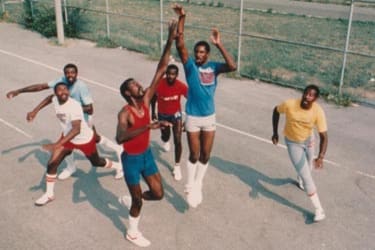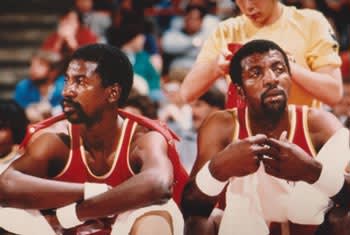One of the greatest risk factors for prostate cancer is family history—whether it is a father, grandfather, uncle, son or brother with the disease, the likelihood if facing with a diagnosis doubles. This risk is further increased if the cancer was diagnosed in a family member at a younger age, 55 years of age or younger, or
 Six of the Jones brothers playing a pick-up game.
Six of the Jones brothers playing a pick-up game.
if it affected three or more family members. For the Jones family—the odds were against them—beginning in 1987 when Caldwell Jones Senior, a father of eight (seven boys and one daughter), was diagnosed with prostate cancer at the age of 75.
The Jones brothers, Caldwell, Major, Oliver, Wilbert, Charles, Melvin and Clinton, have more in common than merely DNA and a father with prostate cancer. Six are retired basketball players who were drafted by the National Basketball Association. A love for the game of basketball required each man, all of whom were over 6’7” tall, to stay physically fit and healthy.
Despite their efforts to stay active through a life of playing basketball and staying active, genetics were not in their favor. Of the seven brothers, Caldwell, Major, Oliver and Clinton—four in total—were diagnosed with prostate cancer.
 Caldwell & Major on the same NBA team for the Houston Rockets.
Caldwell & Major on the same NBA team for the Houston Rockets.
Caldwell Jr. was the first son to be diagnosed at the age of 48. After learning about his course of treatment action, which included prostate surgery, he had a serious conversation with his doctor. The doctor informed him of the increased risk of family members being diagnosed and how vital it was for him to use his voice and communicate with his family. At the time of his diagnosis, the brothers were geographically located across the country, all managing families and careers, but took the news of their brother’s diagnosis very seriously.
“The brothers all got on the phone, vocalizing concerns about Caldwell. Early detection was the key to his beating prostate cancer, and each brother made a commitment to visit their own doctor for a routine screening,” shared Renee Taplin-Jones, Major Jones’ wife. “And thank God that they did, because three other brothers were diagnosed with it. This family has a lot more than a legacy of professional basketball; they have a legacy of fighting prostate cancer.”
Luckily, through early detection and dialogue, all four brothers are cancer-free. A cancer diagnosis has taught each brother a different and unique lesson, though the underlining lesson remains the same: make prostate cancer something to talk about.
With a career in the NBA behind each of them, the brothers are utilizing their successful recoveries to make prostate cancer a better understood disease. Major Jones, a former Houston Rocket and Detroit Piston, is currently the President of the National Basketball Retired Players Association-Houston Chapter where he not only informs chapter members, but other local community members that prostate cancer doesn’t have to be fatal if detected early.
“My brothers and I are living proof that early detection saves lives and prostate cancer doesn’t have to be fatal, stated Major Jones.”
*****
Do you have a story that you would like to share? Tell us.









